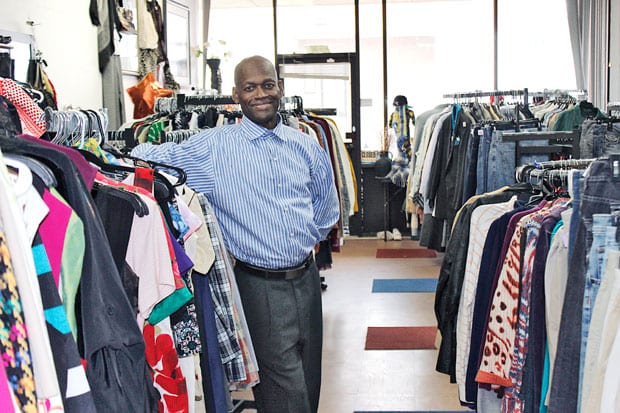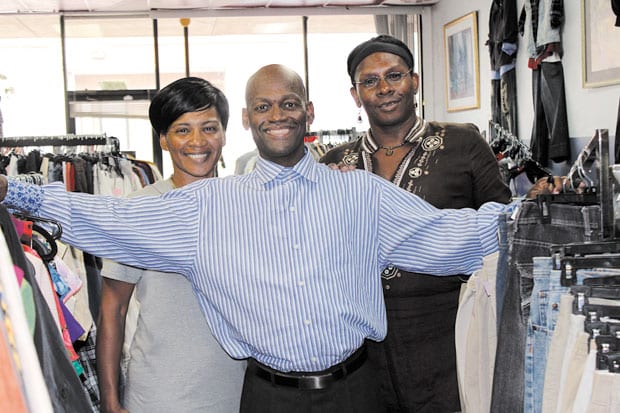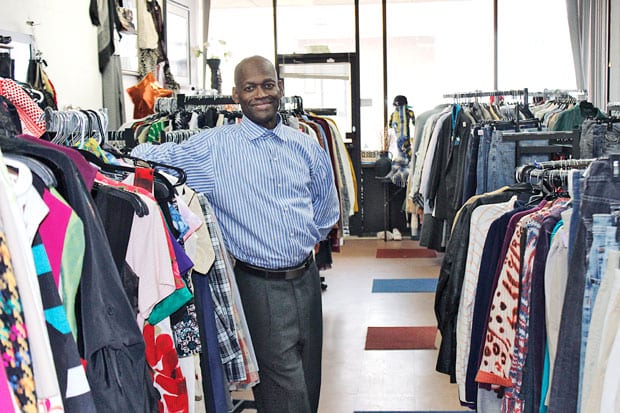Founders Cottage began its existence as a hospice. But as it celebrates its 20th anniversary, the Cottage has instead become a respite facility

Clyde Cooper, pictured at his shop with Rachelle Watson, left, and Joy Knox, says Legacy Founders Cottage loved him to life. (Tammye Nash/Dallas Voice)
DAVID TAFFET | Senior Staff Writer
When Clyde Cooper’s family moved to Dallas in 1980, he decided to stay in Chicago. About 15 years later, after donating blood, he was called into the office and given the news: He was HIV-positive.
“I ignored it,” he said.
That was 1995. New medications were just starting to come on the market, but he felt fine.
Then in 2002, he suddenly couldn’t walk.
“My mom chartered a jet to get me here,” he said. “They put me in hospice.”
Fortunately, the hospice was Legacy Founders Cottage, where, according to Cooper and other residents, “They loved me back to life.”
Cooper said when he entered Legacy, he really didn’t know what a hospice was. He didn’t know that it was a facility where people went to die.
“I just never had any visions of [me] dying,” he said. And the staff at Legacy didn’t see that, either.
Soon after medications became available that were keeping people alive, Legacy staff realized they were becoming the hospice where people refused to die. And as soon as they realized he was not on any drug regimen, the Legacy staff got Cooper into care.
Cooper lived at the cottage for about a year-and-a-half. He used a walker to get around, but one day he went to the bathroom, washed his hands and walked to the doorway. He stopped when he realized something was missing: He had gotten to the door without his walker.
 He improved enough to move out of the cottage and in with his mother. Then one day, Cooper said, “Mom, I’m ready to go back to work.”
He improved enough to move out of the cottage and in with his mother. Then one day, Cooper said, “Mom, I’m ready to go back to work.”At a job fair, Cooper handed a resume to representatives with Hilton. When he didn’t hear from them — or anyone else — he decided to go back to Chicago. While there, someone with Hilton called and left him a voice mail, which he ignored.
But when he returned to Dallas and received another message from them, Cooper interviewed and ended up working for the company for more than a decade.
Then, during a medical exam in 2013, Cooper learned his kidney function was down to 8 percent and that he’d probably need dialysis or a kidney transplant within a year. Today, he’s on a machine 8 hours a night.
But instead of leaving him in despair, the situation just inspired him to do something else. So Cooper decided to open his own business and give back to the community. He opened a new store, Londyn Taylors Resale on North Collins Avenue in Arlington, as a division of Cornerstone Community Church.
“When people come to the cottage, they sometimes come with nothing,” Cooper explained said. So he has offered to make sure Legacy Founders Cottage residents have the clothes they need. Like him, he said, he expects most people who come to the facility may be bedridden when they arrive, but will be on their feet and eventually out of bed. Many will leave the cottage, ready for a new life.
Cooper also gives back to the agency that gave him a new lease on life in other ways. Each year, he said, he’s done some volunteering for Legacy. That has included helping with required Black Tie Dinner volunteer hours or working on one of the many fundraisers that keep the agency running.
20th anniversary
This year, Legacy Founders Cottage celebrates its 20th anniversary. Melissa Grove, executive director of Legacy Counseling Center, the agency that operates the cottage, was the cottage’s first director.
“People were dying alone with no one to care for them,” Grove said. She took the job because her friend Randy had recently died of AIDS, and she figured she’d work there a year to get it off the ground before returning to her more lucrative counseling practice.
The agency had secured a house in Oak Cliff to use as a hospice. The owner of the building told Grove, “If you can chase out the drug addicts, you can use it.”
Volunteer Carolyn Knox chased the squatters out and other volunteers rid the property of a boat filled with used syringes.
“In those beginning days, everyone was dying,” Grove said. “Then, with some TLC, we began to nurse some people back to health.”
Other than Grove, the entire staff were volunteers, and there was no money for food. Family, friends and community groups donated and cooked meals seven days a week.
Grove said she recently ran into someone who was one of the early cottage residents. When he entered the facility, the 6-foot-2 man weighed 85 pounds. Slowly, he recovered from the opportunistic infection that threatened to take his life until one day, Grove had to kick him out: “You’re too healthy,” she told him.
That was the first time someone left the cottage alive.
A year after Legacy Founders Cottage opened, drugs came on the market that seemed to be keeping people alive. Grove’s reaction to her year of work getting the cottage established was, “Well, this was useless.”
But then Founders Cottage evolved into something completely different. Instead of being a place where people came to die, it became a place where people came to live. In 2006, the facility expanded from four to seven rooms and received the designation of respite facility rather than hospice as it became more relevant than ever.
Today, most cottage residents come from Parkland Hospital after they’ve been gravely ill and have nowhere to go to continue recovering. They may spend anywhere from two weeks to two years at the cottage, but most stay for two to five months.
Founders Cottage Director Brooke Nickerson, who’s been with the agency almost six years, said today a staff member goes out to hospitals or homes and begins formulating a discharge plan even before that person enters the cottage. That helps turn over beds quicker.
This past week, Nickerson had a very sad week. Two of her residents died. That’s something that hasn’t happened at the cottage for years. In fact, a few years ago, she went two years without losing a resident. Last year, out of 27 people who spent time at the cottage, she lost four.
“We’re getting sicker patients [again] lately,” Nickerson explained.
The two recent deaths weren’t from opportunistic infections — those illnesses caused by a suppressed immune system due to the action of the HIV virus. Instead, they died from co-morbidities — illnesses such as cancer that were unrelated to their HIV.
Nickerson and her staff provide assistance to additional patients they can’t accommodate at the cottage. Last year, 18 people benefited from case management that place people in other facilities or found them housing where they were able to recover from lengthy hospital stays and illness that required long recovery periods.
To ease residents into the next step, Legacy established its Master Leasing Program, which includes an apartment and case management while living in the apartment that is subsidized by a grant.
Case managers will also help others obtain Dallas Housing Authority vouchers or subsidies from other programs, find an apartment, fill out paperwork and move.
To help prepare them for life on their own again, Nickerson said she runs classes on budgeting.
One of the most helpful things she’s found, though, is when former residents return to the cottage and talk to current residents about how they made a successful transition from hospice care to respite and recovery to independent living.
This article appeared in the Dallas Voice print edition November 4, 2016.










